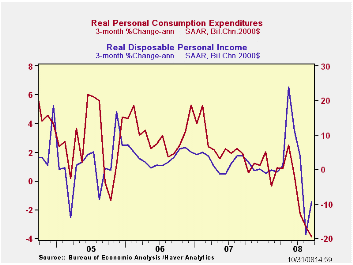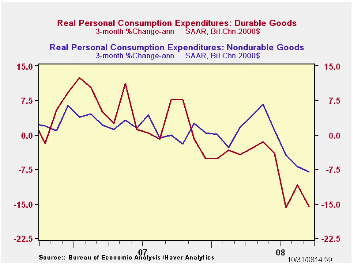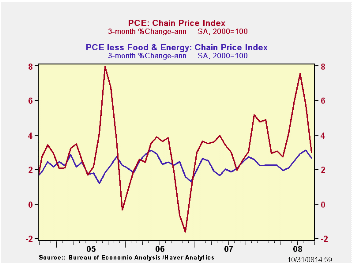 Global| Oct 31 2008
Global| Oct 31 2008U.S. September Income Rose, Spending Fell: Trend Growth of Both Down
by:Tom Moeller
|in:Economy in Brief
Summary
During September nominal personal income rose 0.2%, just half the revised 0.4% August increase. Moreover, a slowing growth trend was evident in the y/y gain of 3.9% which was down sharply from last year's 6.1% rise and the 7.1% [...]

During September nominal personal income rose 0.2%, just half the revised 0.4% August increase. Moreover, a slowing growth trend was evident in the y/y gain of 3.9% which was down sharply from last year's 6.1% rise and the 7.1% increase during 2006. The September increase in personal income exceeded Consensus expectations for a 0.1% rise.
Disposable personal income rose 0.2% last month after 1.0%-to-1.8% declines during the prior three months. They occurred due to the absence of tax rebate checks. Weaker job gains have slowed trend growth to 4.2% y/y after last year's rise of 5.5% and 6.4% during 2006.
Weaker gains in wage & salary income very much reflect the soft jobs environment. Wages rose 0.1% last month, up 3.4% y/y. Three month growth of 3.1% (AR) was considerably below the 9.8% rate of growth early last year. Factory sector wages fell 0.3% (+0.2% y/y) for the second consecutive monthly decline. On a three-month growth basis, wages fell at a 1.3% annual rate after 2.0% growth last year. Wages & salaries in the private service-providing industries ticked up 0.1% (3.6% y/y) and, here again, the trend growth of 3.0% is well below a 2006 gain of 6.4%. Wages in the government sector rose 0.4% (5.1% y/y) and three-month growth of 5.1% was stable.
Proprietors' income fell 0.3% (+1.8% y/y) after a 1.0% August decline. On a three-month basis, the 3.4% rate of negative growth very much reflects the weaker retail environment, after the 4.1% gain last year. Interest income rose 1.1% (-0.2% y/y) for the third straight month due to the recent rise in interest rates off their March lows. Dividend income fell 0.6% (+4.1% y/y) for the third consecutive month and prior months' gains were revised away. Growth of 4.1% y/y compares to a 12.4% rise last year and a 21.7% rise during 2006.
Personal consumption expenditures fell 0.3% after the unrevised sideways movement in August. Adjusted for price inflation, real spending fell 0.4% (-0.4% y/y) last month for the third decline in the last four months. Three-month growth in real spending dropped to negative 3.9% (AR) after the 2.8% gain last year. Real spending on motor vehicles fell at a 23.5% annual rate during the last three months while furniture spending fell at a 10.9% rate following an 8.0% gain last year. Spending on clothing fell at a 14.6% rate during the last three months after a 4.7% rise last year.
The PCE chain price index rose just 0.1% as a 0.7% decline (+31.5% y/y) in gasoline prices was offset by a 0.7% rise in food prices. On a three-month basis, food prices were up at a 9.1% rate after a 3.8% rise last year. The core PCE price index rose 0.2% for the second consecutive month but the rise surpassed Consensus expectations for a 0.1% uptick. Three-month growth of 2.6% was up from a 2.2% during all of last year. Apparel prices have been rising at a 6.6% rate after a 0.8% decline last year and transportation costs have been rising at a 5.2% rate after 2.7% growth last year.
The personal savings rate recovered to 1.3% as spending fell.
The figures noted above are available in the Haver USECON and in the USNA databases.
| Disposition of Personal Income (%) | September | August | Y/Y | 2007 | 2006 | 2005 |
|---|---|---|---|---|---|---|
| Personal Income | 0.2 | 0.4 | 3.9 | 6.1 | 7.1 | 5.6 |
| Disposable Personal Income | 0.2 | -1.0 | 4.2 | 5.5 | 6.4 | 4.4 |
| Personal Consumption | -0.3 | 0.0 | 3.8 | 5.5 | 5.9 | 6.2 |
| Saving Rate | 1.3 | 0.8 | 0.6 (Sept. '07) | 0.5 | 0.7 | 0.3 |
| PCE Chain Price Index | 0.1 | 0.0 | 4.2 | 2.6 | 2.8 | 2.9 |
| Less food & energy | 0.2 | 0.2 | 2.4 | 2.2 | 2.3 | 2.1 |
Tom Moeller
AuthorMore in Author Profile »Prior to joining Haver Analytics in 2000, Mr. Moeller worked as the Economist at Chancellor Capital Management from 1985 to 1999. There, he developed comprehensive economic forecasts and interpreted economic data for equity and fixed income portfolio managers. Also at Chancellor, Mr. Moeller worked as an equity analyst and was responsible for researching and rating companies in the economically sensitive automobile and housing industries for investment in Chancellor’s equity portfolio. Prior to joining Chancellor, Mr. Moeller was an Economist at Citibank from 1979 to 1984. He also analyzed pricing behavior in the metals industry for the Council on Wage and Price Stability in Washington, D.C. In 1999, Mr. Moeller received the award for most accurate forecast from the Forecasters' Club of New York. From 1990 to 1992 he was President of the New York Association for Business Economists. Mr. Moeller earned an M.B.A. in Finance from Fordham University, where he graduated in 1987. He holds a Bachelor of Arts in Economics from George Washington University.
More Economy in Brief
 Global| Feb 05 2026
Global| Feb 05 2026Charts of the Week: Balanced Policy, Resilient Data and AI Narratives
by:Andrew Cates






